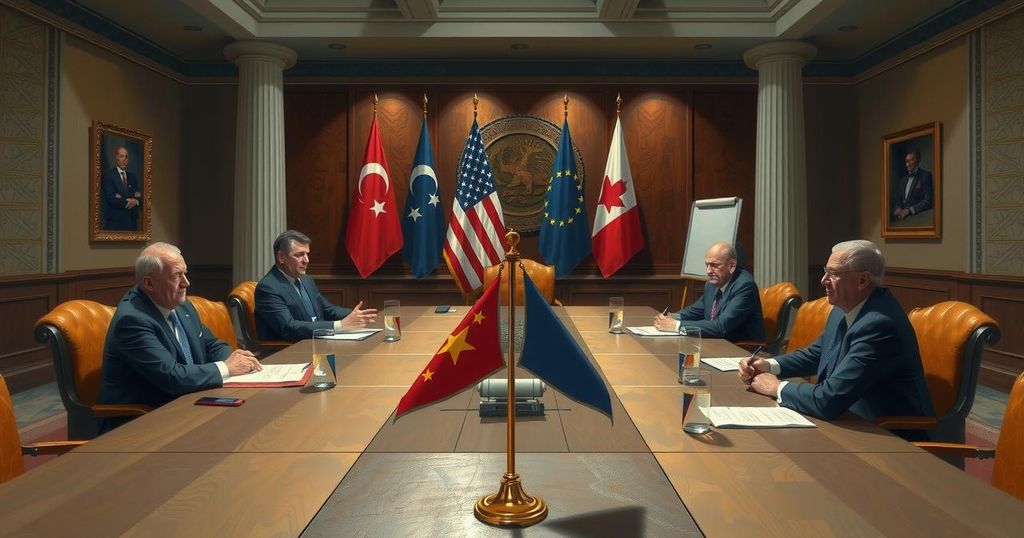Trump Questions Ramaphosa on Farm Violence in White House Meeting
During a White House meeting, former President Trump abruptly challenged South African President Ramaphosa regarding allegations of farm seizures and violence against white farmers. This unexpected confrontation ignited debates about land reform in South Africa, with Ramaphosa defending his government’s actions as legal and necessary. The political implications of the meeting could affect U.S.-South Africa relations, raising concerns from analysts about the diplomatic fallout.
In an unexpected twist during a scheduled diplomatic meeting at the White House, former U.S. President Donald Trump confronted South African President Cyril Ramaphosa with allegations concerning farm seizures and violence against white farmers in South Africa. The initial agenda was set to discuss trade and regional security, but the atmosphere changed swiftly when Trump raised these contentious issues.
Sources report that just before the meeting turned private, cameras were granted brief access, yet the tone soured rapidly. A diplomat familiar with the situation commented, “It felt more like a set-up than a summit,” highlighting how Trump aggressively questioned Ramaphosa regarding accusations of land reform going awry, which are frequently circulated in conservative media outlets.
Trump reportedly referenced videos from 2018, claiming that the South African government was engaged in systemic land appropriation from white farmers, even presenting printed screenshots from American news sites to bolster his argument. He asked, “Isn’t it true your government is taking land without compensation?” prompting a strong, yet diplomatic reply from Ramaphosa.
According to those present, Ramaphosa upheld the legitimacy of South Africa’s land reform while asserting that it aims to resolve historical injustices and not to discriminate against any racial groups. He declared, “There is no state policy of confiscation. There is no campaign of killing. We are a constitutional democracy.”
To contextualize these allegations, it should be noted that claims regarding state-sponsored land grabs and the killing of white farmers have not been substantiated by credible evidence. While there have been discussions around constitutional amendments permitting land expropriation without compensation, there have been no mass confiscations as claimed.
The conversation around farm murders is equally complex. Both black and white farmers are victims of violent crime in South Africa. Independent research and data from the South African Police Service indicate that while the murder rate among farmers is high, there is no official evidence linking these incidents to racial or political motives.
In fact, in 2018 the U.S. Embassy in South Africa indicated there was “no reason to believe that there is a deliberate campaign” against white farmers, and independent fact-checkers have thoroughly debunked assertions that such killings constitute genocide.
Post-meeting, Ramaphosa’s team released a measured statement indicating the leaders engaged in a “frank exchange of views,” emphasizing their wish to maintain ongoing dialogue. Conversely, Trump shared on his social media platform that he had “confronted the South African president with the truth the fake media won’t report.”
Analysis of the situation hints at potential diplomatic repercussions. Analysts speculate that although Trump’s confrontational style may inspire his political base, it risks straining bilateral relations between the U.S. and South Africa if not managed diligently.
Following the meeting, Ramaphosa spoke to the press, reiterating South Africa’s commitment to constitutional democracy and inclusivity. He mentioned, “We remain committed to addressing our country’s challenges through democratic means and dialogue, ensuring that all South Africans, regardless of race, feel safe and valued.”
Commentators have expressed mixed views on the encounter. One unnamed analyst from Johannesburg said, “It’s political theatre for Trump, but it puts Ramaphosa in a tight spot. No one likes being called a liar to their face in front of the cameras.” The implications of this meeting are still unfolding, raising questions about the future of U.S.-South Africa relations.
In conclusion, the recent meeting in the Oval Office between former President Trump and President Ramaphosa took an unexpected turn when Trump challenged Ramaphosa on allegations regarding farm seizures and violence against white farmers in South Africa. While Trump cited unverified claims, Ramaphosa firmly defended his country’s land reform processes as legal and aimed at rectifying historical injustices. The ramifications of this exchange for U.S.-South Africa relations remain uncertain, with concerns over potential diplomatic fallout. The situation underscores the complexity surrounding land issues in South Africa and highlights the differing narratives presented by leaders on both sides.
Original Source: www.thestkittsnevisobserver.com




Post Comment